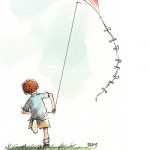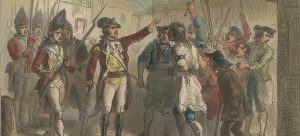
Self-Isolation: A Reader’s Odd Paradise
Books running the gamut from dark to light, to keep you company in uncertain times
By Brian Lampkin
As we enter another month of enjoying our time with our families and roommates, we’re all thinking about what we should read next (because really how much FaceTime Monopoly can we play?). Here are some suggestions that deal directly (or indirectly) with pandemics, crisis and dystopia. But that’s the last thing some people want. So let’s add another list of some great reading to avoid despair, decay and disease. For best results, choose one from each column.
The Worst of Times . . .
There are some obvious choices here like Camus’ The Plague, Márquez’s Love in the Time of Cholera, or Stephen King’s flu epidemic novel The Stand, but let’s look at some more recent titles that might illuminate our current crisis or even directly address it.
Erik Larson has a new non-fiction (The Splendid and the Vile, Crown, $32) that explores a country’s response to seemingly unbearable conditions. The daily WWII bombing of London and England generally by the Nazi regime created an atmosphere of fear and constant risk of death. How does a country survive such daily dread? Larson looks closely at Churchill’s role in communicating the reality of the situation along with a conviction that his country will persevere.
Station Eleven, by Emily St. John Mandel (Vintage 2015, $16.95), imagines a rapidly spreading flu epidemic, overrun hospitals and barricaded isolation zones. Too on-the-nose? Mandel’s novel is terrifying yet somehow also about survival and the necessity of art in even the direst of circumstances. Her latest work, The Glass Hotel (Knopf 2020, $26.95), is another story of crisis and survival, and Ron Charles at The Washington Post calls it “the perfect novel for your survival bunker.” It’s also an exploration of money, beauty, white-collar crime, ghosts and moral compromise in which a woman disappears from a container ship off the coast of Mauritania and a massive Ponzi scheme implodes in New York.
Pale Rider: The Spanish Flu of 1918 and How It Changed the World, by Laura Spinney (Public Affairs 2018, $16.95), The Spanish flu of 1918–1920 was one of the greatest human disasters of all time. It infected a third of the people on Earth — from the poorest immigrants of New York City to the king of Spain, Franz Kafka, Mahatma Gandhi and Woodrow Wilson. Spinney draws on the latest research in history, virology, epidemiology, psychology and economics, to masterfully recount the little-known catastrophe that forever changed humanity.
There’s a new understood queen of science fiction and N. K. Jemisin’s, The City We Became (Orbit 2020, $28), reminds us why she wears the crown. Five New Yorkers must come together in order to save their city from destruction in the first book of a stunning new series. Every great city has a soul. Some are ancient as myths, and others are as new and destructive as children. New York? She’s got six. When a young man crosses the bridge into New York City, something changes. He doesn’t remember who he is, where he’s from, or even his own name. But he can feel the pulse of the city, can see its history, can access its magic. And he’s not the only one. All across the boroughs, strange things are happening. Something is threatening to destroy the city and her six newborn avatars unless they can come together and stop it once and for all.
Always Look On the Bright Side . . .
There are classics in the genre of offering comfort in troubled times as well, and many of us have personal favorites. When I was a young man (but still too old to actually admit to my age here), a friend read Trina Paulus’ Hope for the Flowers to me when I was feeling down and out. It helped. My teenage daughters recommend the Percy Jackson series as a diverting and hopeful alternative.
More recent releases include the hard-to-keep-in-stock Untamed, by Glennon Doyle (Dial Press 2020, $28). Soulful and uproarious, forceful and tender, Untamed is both a memoir and a galvanizing wake-up call. It offers a piercing, electrifying examination of the restrictive expectations women are issued from birth and shows how hustling to meet those expectations leaves women feeling dissatisfied and lost. Untamed shows women how to be brave. As Glennon insists: “The braver we are, the luckier we get.”
With graduation upon us — even if actual graduations are sadly absent — it might be nice to offer a book that refuses the heavy pretentiousness of the occasion and offers instead some much-needed irony and a great deal of generosity of spirit. Kurt Vonnegut’s If This Isn’t Nice, What Is? (Seven Stories 2020, $17.95) has been newly reissued and expanded. Remember this: “There was one thing I forgot to say, and I promised I would say, and that is, ‘We love you. We really do.’”
We’re in nature a lot these days. I recently read Thorpe Moeckel’s wonder almanac Down By the Eno, Down By the Haw (Mercer University 2019, $16) and found it the perfect book for the times. Hallucinatory in its immersion in the wild and in its strange and specific language, I found this book diverting in just the way a great walk can be: awed by the new, charmed by the familiar, and fully engaged with the present.
And finally, each of the following North Carolina writers have had books published in the recent weeks and have had all of the events promoting their new books canceled. Imagine the muted excitement of having a new book published to the sound of crickets. Order their books if you’re interested and able:
Tyranny of Questions, by Michael Gaspeny (Unicorn Press, $18). A novel-in-verse that dares to believe in the literary imagination and a writer’s empathetic chops.
I See You So Close: The Last Ghost Series, Book Two, by M. Dressler (Arcade Publishing, $24.99). Guilford College writer-in-residence brings us part two of her engaging series.
Blue Marlin, by Lee Smith (Blair, $15.95). A very personal novella from North Carolina’s literary force.
The More Extravagant Feast: Poems, by Leah Green (Graywolf, $16). Greensboro native and winner of the 2019 Walt Whitman Award. OH
Brian Lampkin is one of the proprietors of
Scuppernong Books.
Hey faithful O.Henry readers! Scuppernong Books remains open in these isolating times for all orders: website (scuppernongbooks.com), email (scuppernongbooks@gmail.com) or phone call (336-763-1919). We can’t allow walk-in traffic, but we can ship books out to you and in most cases you’ll get your literary survival kit within a week. Please try to remember all of our small and local businesses during this continued social distancing.





